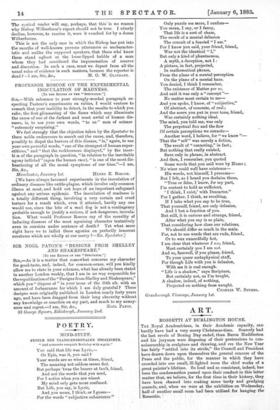PROFESSOR ROSCOE ON THE EXPERIMENTAL INOCULATION OF MADNESS.
[To THE EDITOR OF SHE " SPECTATOR:3] SM—With reference to your strongly-worded paragraph re- specting Pasteur's experiments on rabies, I would venture to remark that your inability to detect, in the results to which you refer, the first glimmering of the flame which may illuminate the cause of one of the darkest and most awful of human dis- eases, is, to use your own words, "to us" men of science "extremely surprising."
We feel strongly that the objection taken by the Spectator to these noble endeavours to search out the cause, and, therefore, possibly to dispel the horrors of this disease, "is," again, to use your own powerful words, "one of the strangest of human super- stitions," and "that the recklessness displayed," by the inser- tbn of the paragraph in question, "in. relation to the inevitable agony inflicted" (upon the human race), "is one of the most dis- heartening of all the moral symptoms of our time."—I am, Sir, &c., [We have always favoured experiments in the inoculation of ordinary diseases like cattle-plague, which involve only common illness at most, and hold out hope of an important safeguard against any serious epidemic. The inoculation of madness is a totally different thing, involving a very certain and cruel torture for a result which, even if attained, hardly any one would use, since the bite of a mad dog is not a contingency probable enough to justify a serious, if not dangerous, inocula- tion. What would Professor Roscoe say of the morality of inducing diseases of the most agonising character tentatively even in convicts under sentence of death ? Yet what more right have we to inflict these agonies on perfectly innocent creatures which are wholly at our mercy P—En. Spectator.]














































 Previous page
Previous page